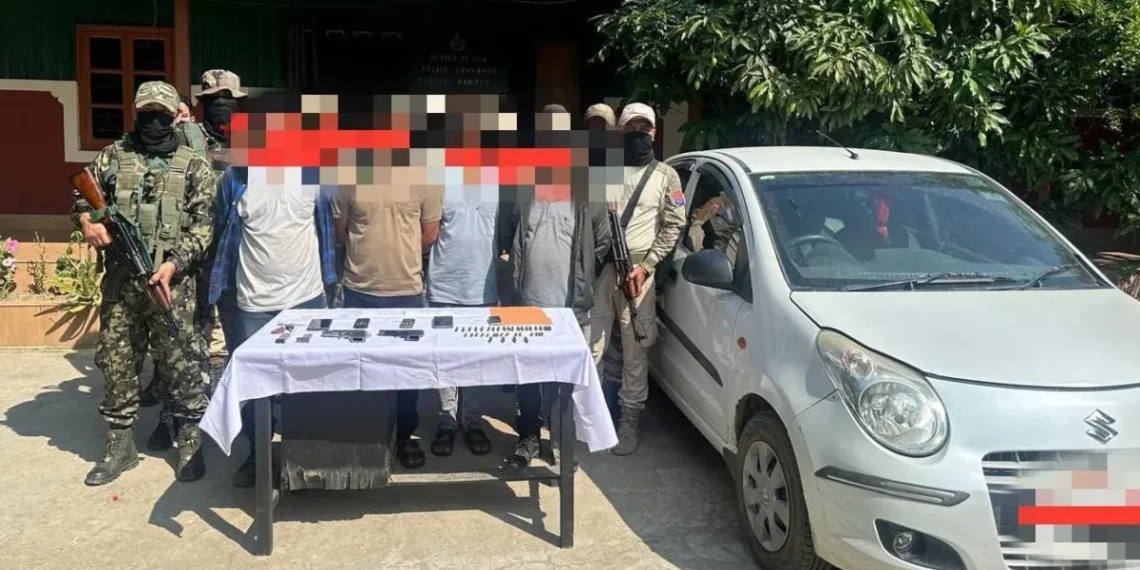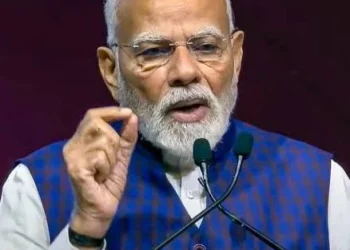In strife-torn Manipur, a thriving extortion network threatens businesses, government employees, and developmental projects, leaving the state grappling with economic stagnation and incomplete infrastructure.
New Delhi
On December 1, Manipur Police apprehended five cadres of banned insurgent groups in multiple operations aimed at cracking down on extortion and related illegal activities in the state. This followed a November 24 operation in which four individuals were arrested for the abduction of Dr. Kh. Nabakeshore, a medical officer from Langthabal Kunja Awang Leikai. Dr. Nabakeshore was kidnapped on November 22 for ransom but was safely rescued by police from a farmhouse in Lamdeng under the Lamshang police station limits.
These cases highlight the pervasive extortion and kidnapping rackets that plague strife-torn Manipur. Complaints against insurgent groups and criminal networks continue to flood the anti-extortion cell of the Manipur Police. Government officials, contractors, and professionals are frequently targeted, often forced to pay hefty sums under threats of severe consequences.
Extortion has a crippling effect on the local economy. Small and medium businesses, which are the backbone of Manipur’s economy, face relentless financial pressure from extortionists. Shopkeepers, market vendors, and transport operators are often forced to pay monthly “taxes” ranging from ₹5,000 to ₹50,000, depending on their location and business scale. For many, these payments consume a significant portion of their profits, leaving little for reinvestment or growth.
“What can we do but to pass the costs on to consumers in the form of higher prices, “ a businessman told the Power Corridor over phone.
Deterrence to Investment
The persistent threat of extortion discourages outside investment in the state. Entrepreneurs and corporations view Manipur as a high-risk area, where the cost of doing business is elevated by illegal demands. Potential investors in sectors such as tourism, retail, and manufacturing are deterred by the instability, depriving the state of opportunities to create jobs and improve infrastructure.
Government-funded projects, which could have brought substantial development to the state, often become prime targets for extortionists. Contractors and suppliers involved in infrastructure projects such as road construction, bridges, and public utilities are forced to pay a percentage—often 5–10%—of the project budget to insurgent groups. These additional costs either inflate project expenses or lead to the abandonment of initiatives, leaving critical infrastructure incomplete.
Impact on Government Employees and Institutions
Extortion has also infiltrated public services. Government employees, especially those in education, health, and public works, are forced to pay monthly “revolutionary taxes” ranging from ₹1,000 to ₹10,000. These demands reduce their disposable income and morale, affecting their productivity and willingness to serve in remote or high-risk areas.
Educational institutions and healthcare providers are not spared. Schools and colleges face annual demands ranging from ₹10,000 to ₹1 lakh, while private clinics and hospitals must pay between ₹20,000 and ₹2 lakh annually. The fear of disruption to essential services often compels these institutions to comply, diverting funds from improving facilities or hiring additional staff.
“If we don’t pay up, who knows what will happen? We have to think of our own security and security of our family members,” said a government employee.
Undermining Developmental Projects
Developmental projects, both government-funded and private, are severely affected by extortion. Infrastructure projects such as highways, schools, and water supply systems often experience delays or cost overruns due to demands from insurgent groups. In some cases, contractors abandon projects altogether, fearing for their safety or the financial burden of extortion.
For example, rural development initiatives aimed at improving connectivity or providing clean drinking water are frequently stalled due to threats or interference by insurgents. The result is a lack of basic infrastructure in many parts of the state, perpetuating poverty and underdevelopment.
“ The worst scenario id when more than one groups seeks “levy” on the same project. How do we maintain quality and save our lives in such a scenario?” said a contractor at the condition of anonymity.
Social and Psychological Costs
Beyond the financial implications, extortion creates a pervasive climate of fear and mistrust. Communities often feel powerless against the influence of insurgent groups, leading to a breakdown of social cohesion. Entrepreneurs and professionals are reluctant to engage in community-building initiatives, fearing they may become targets. This lack of trust stifles innovation and cooperation, further hindering progress.
Notable Cases of Extortion and Kidnapping
- Abduction of Dr. Kh. Nabakeshore (November 2024):
Dr. Kh. Nabakeshore was abducted on November 22, 2024, and held for ransom. Following an intensive operation, police rescued him and arrested four individuals linked to the abduction. The suspects were found in possession of arms and ammunition. - Extortion by Kangleipak Communist Party (KCP) and PREPAK (PRO) (October 2024):
In October 2024, six militants from KCP and PREPAK (PRO) were arrested in Thoubal and Bishnupur districts. Their activities included abductions and extortion attempts during ethnic clashes. Police seized two hand grenades and demand letters during the operation. - Extortion by Kangleipak Communist Party (People’s War Group) (November 2024):
In November 2024, three members of the KCP-PWG were arrested for extortion and illegal possession of weapons. Those arrested included Chongtham Shyamchandra Singh (23), Maibam Suraj Khan (32), and Boghimayum Sahid Khan (30). Seized items included three live INSAS cartridges and an empty .32 ammunition case.
Targets of Extortion in Manipur
Extortionists in Manipur target a wide spectrum of individuals and organizations, leveraging fear and coercion to sustain their illegal operations. Common targets include:
- Small and Medium Businesses: Local shopkeepers and transport operators are pressured to pay monthly amounts ranging from ₹5,000 to ₹50,000.
- Large Enterprises and Contractors: These entities often face demands for 5–10% of project budgets, running into lakhs of rupees.
- Government Employees: Regularly referred to as “revolutionary taxes,” demands range from ₹1,000 to ₹10,000 monthly.
- Educational Institutions and Healthcare Providers: Institutions are forced to pay ₹10,000 to ₹2 lakh annually to avoid disruptions.
- Transport Operators: Bus and truck drivers face extortion at illegal checkpoints, with demands ranging from ₹500 to ₹2,000 per trip.
- Politicians and Community Leaders: High-profile individuals often face demands exceeding ₹5 lakh during election campaigns or significant projects.
Methods of Extortion
- Direct Threats: Victims face threats of physical harm, arson, or property damage if they refuse to comply.
- Social Pressure: Demands are often disguised as contributions to community welfare or ideological causes.
- Checkpoint Extortions: Insurgents establish illegal checkpoints on highways, forcing travelers and transport operators to pay fees.
- Blackmail: Extortionists exploit knowledge of malpractices or personal information to coerce payments.














